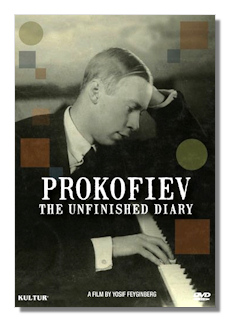
The Internet's Premier Classical Music Source
Related Links
- Prokofieff Reviews
- Latest Reviews
- More Reviews
-
By Composer
-
Collections
DVD & Blu-ray
Books
Concert Reviews
Articles/Interviews
Software
Audio
Search Amazon
Recommended Links
Site News
 DVD Review
DVD Review
Serge Prokofieff

The Unfinished Diary (Documentary)
A film by Yosif Feyginberg
Narrated by Richard Clarkin
Excerpts from various Works
Kultur DVD D4802 52min Letterbox Dolby 2.0
In this documentary video covering Prokofiev's life based on his diaries from his years abroad, 1918-1936, we get a somewhat different view of the composer. Interviews, archival footage, photographs, and much else is presented to uncover mysteries surrounding Prokofiev or to debunk myths about him.
The documentary makes use of recent archival discoveries made by Prokofiev biographer Simon Morrison, a professor at Princeton University. Morrison makes extensive, often revelatory commentary about Prokofiev throughout this video. He was the first scholar to be allowed access to previously inaccessible files about Prokofiev in the Russian State Archives. The late Noelle Mann, who was curator of the Prokofiev Archive at Goldsmiths College in London, also contributes much insight about the composer, as do Prokofiev's son, Sviatoslav (1924-2010), and grandson, Serge. And there are many others who offer commentary, including pianists Yefim Bronfman and André Laplante. So, what do we learn?
Morrison points out that it has been a common myth that Prokofiev and Stravinsky had an adversarial relationship, and he asserts the two composers were actually quite friendly, shared analysis of each other's works, mocked each other good-naturedly, and generally got along quite well. But other biographies mentioned their many meetings where they discussed their music and socialized. There have been photographs of the two together available for years and so we knew they must have been friendly at least for a while. And we also knew both composers were later reluctant to praise the other's music. That said, I'll accept Morrison's claim that Prokofiev and Stravinsky had a better relationship than was generally believed.
Morrison also states his belief that Prokofiev was a loner. Probably so, but then what composer, to one extent or another, wasn't a loner? You can't spend long hours composing with a drink in your hand at a party. Solitude is the ally of creativity.
We have been aware of Prokofiev's interest in Christian Science but here we not only learn about his conversion and devotion to the Christian Science religion, but about how it conflicted with his opera The Fiery Angel, a work about demons, exorcism, and other spiritual excesses. Apparently, Prokofiev actually considered destroying the work at one time, because after writing it (or most of it) he came to believe virtually everything in it was at odds with what he believed through the Christian Science religion.
Maybe this is one of the reasons the work was never performed in his lifetime: it would now seem that Prokofiev didn't try very hard to secure a performance of it. Musicologists have charged its long neglect to the composer's relative lucklessness in opera during his lifetime. But it would appear that it was Prokofiev's own ambivalence about getting the work to the stage that accounted for its belated premiere (Venice; 1955, two years after his death), because he left the score behind in France when he returned to Russia in 1936! (Musicologist Hans Swarsensky found the manuscript in the basement of a French publishing house and eventually got it performed.) I must say this is my speculation about the circumstances of the delayed premiere of this great opera and these ideas are not presented in the film. Prokofiev did get Koussevitzky to do a partial concert performance of the opera, but that should never have quenched his thirst to have the whole work performed.
Prokofiev's initial financial struggles in the US are also revealed in the video, as well as his attitudes about music in this country and abroad. Much of this is not new, but we do learn that the seemingly confident young Prokofiev did have great feelings of insecurity at the outset of his stay here in the US. We see him here as a somewhat more vulnerable fellow than we had previously thought.
We also learn about why he returned to the Soviet Union, about promises that were made to him and how he fell into a trap set by the Soviets. This is perhaps the most intriguing part of the film and here we see Prokofiev as principled but rather naïve politically, something we strongly suspected before but now know to be a fact.
I could go on and cite further examples, but let me just say that there is much new information for Prokofiev mavens to digest here. I'm not sure this video will radically change the way we view the composer, but it does put many things about him in a different perspective. I was engrossed by the film and only wish it would have gone on to include Prokofiev's Soviet period and, for that matter, his pre-Revolutionary Russian years. By the way, besides hearing Prokofiev's music in the background throughout much of the video, music from his operas, ballets, concertos, piano pieces and other works are presented in fine excerpted performances. The sound is good and film quality generally quite excellent.
This documentary was shown on the Bravo network in Canada in, I believe, 2009. The filmmaker Yosif Feyginberg also made a notable documentary about Glenn Gould and has stated in an interview that his three favorite composers are Bach, Shostakovich and Prokofiev. Born in Smolensk, Russia, Feyginberg obviously understands music and understands Prokofiev. This documentary is highly recommended to admirers of Prokofiev and those interested in the seminal figures of 20th century music.
Copyright © 2012, Robert Cummings




















